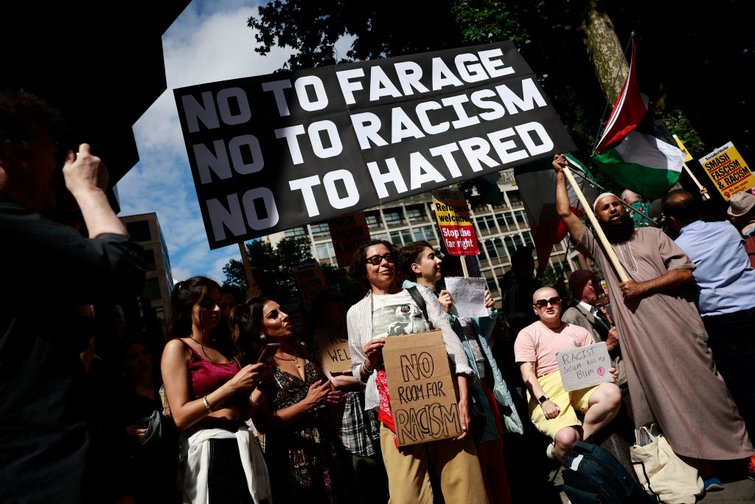After racist violence gripped England and Northern Ireland, migrants are shaken and remain on high alert
Aya Khedairi
13 August 2024

Protest in support for migrants |
BENJAMIN CREMEL/AFP via Getty Images
The past weeks for migrants, people of colour and Muslims across England and Northern Ireland have felt like a living nightmare, as far right racists assaulted and threatened racialised people, including with acid attacks, burning their cars, damaging mosques, smashing homes and migrant accommodation, and leaving high streets in total disarray.
Despite a flurry of statements of condemnation from migration charities, this is not enough, with migrant voices themselves having been largely missing from the public conversation. I work at the charity Migrants Rights Network, which works with organisations across the UK to enable migrants to speak truth to power on immigration and issues that affect their lives. That’s why we decided to ask migrants, including refugees, in our community for their thoughts on the attacks and how they’ve fared over the past few weeks.
One of the many common threads that came through was that, although this weekend did not see any large-scale riots again, and anti-racist demonstrators came out in force in London and Birmingham among other places – many migrants have retreated indoors, too scared to go outside in case of attacks. Many have bordered up their local shops, while high streets in areas with a high proportion of, have been quieter than usual.
“I never thought I would be in lockdown again but this time for being Black,” said Lorraine, a refugee from Malawi and migrants’ rights campaigner. “We are being hunted like animals.”
Another clear thread was a clear frustration from migrants on the lack of migrant representation in media coverage. Javier, a linguist from Spain, explained how the voices of migrants with their individual journeys and experiences are shut down: “The mainstream narrative has failed to address the many decades of political and media discourse which have vilified the human right of migration.”
Angelo, a journalist from Italy and member of Black Europeans also voiced his frustration at the media portrayal of the violence: “Talking about far-right ‘thuggery’ means losing sight of the bigger picture. What we are witnessing is racist and Islamophobic terror and it finds its roots in the normalisation of the far-right rhetoric as well as in the colonial history of the United Kingdom”.
This isn’t the first time that racism and anti-migrant hate has arisen in recent history. Those voting to leave the EU were more likely to agree with the statement: “immigrants threaten their values and way of life”. And we saw the rise in hate crime and racist attacks that occurred post-Brexit.
“The media, beyond the usual tabloids, is to blame for having provided a platform to known figures and inflammatory language”, Angelo continued.
“The fact that what is happening is being labelled in the mainstream as “riots” or that we hear about “legitimate concerns” is part of the problem. The rhetoric against Muslims, people of colour and migrants is extremely toxic and it is so mainstream because in the years after Brexit this has been so normalised. People of colour and migrants in the country now live in fear because a similar scenario has been enabled”.
Alongside demands for a stronger, anti-racist narrative around the violence, migrants also stated that this moment should mark a shift beyond reactive or performative statements, including in the charity sector itself.
While racialised people, including migrants, in our network have been moved by the acts of solidarity by communities in the form of counter-demonstrations, what is clear is that this has not been accompanied by optimism.
Let’s cast our minds back to the murder of George Floyd and subsequent Black Lives Matter protests. The aftermath was shaped by a rush to be seen to condemn in the form of equality, diversity and inclusion (EDI) statements and social media posts all promising to tackle racism. But here we are again.
What has become clear from our community is the desire for this energy to be sustained long-term and for meaningful action to be taken beyond this moment – one that centres migrants and tackles the root of anti-migrant racism and Islamophobia.
As Javier told us: “There are more dark days to come, but I genuinely hope there can be a power shift once and for all to benefit the migratised community.”
No comments:
Post a Comment